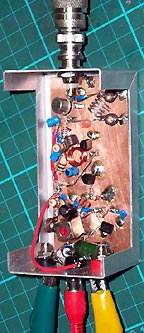Thursday 13 March, 2008, 08:41 - Pirate/Clandestine
 Finding a frequency must be one of the most fraught tasks for any prospective London pirate radio operators. The band is now so crammed with stations that there are next to no gaps anywhere. The problem is not made any easier by the BBC using lots of frequencies to infill coverage of its local stations; nor by the new wave of community stations taking to the air. Now don't get me wrong, BBC, commercial and community radio stations have a licence and are authorised and legitimate users of the FM band and as such should be respected, and nothing hereinafter should be in any way taken as non-recognition of that important fact. But the fact also remains that pirate radio stations exist and are likely to continue to exist until technology renders them irrelevant and that finding a frequency that doesn't cause interference to these legitimate users, which is a goal to be aimed for if both legal and illegal stations are to co-exist, is nigh-on impossible.
Finding a frequency must be one of the most fraught tasks for any prospective London pirate radio operators. The band is now so crammed with stations that there are next to no gaps anywhere. The problem is not made any easier by the BBC using lots of frequencies to infill coverage of its local stations; nor by the new wave of community stations taking to the air. Now don't get me wrong, BBC, commercial and community radio stations have a licence and are authorised and legitimate users of the FM band and as such should be respected, and nothing hereinafter should be in any way taken as non-recognition of that important fact. But the fact also remains that pirate radio stations exist and are likely to continue to exist until technology renders them irrelevant and that finding a frequency that doesn't cause interference to these legitimate users, which is a goal to be aimed for if both legal and illegal stations are to co-exist, is nigh-on impossible. Since 2000 Ofcom (and its predecessor the Radiocommunications Agency) have been aware (through an oft overlooked study that examined the re-planning of the FM band) that there are small pockets of the FM band that could be used for low-power, limited geographical coverage transmitters in and around London, and it is the results of this study that are, to a large extent, enabling the licensing of the community stations. It's also interesting to note that many of these community stations are using frequencies that were esrtwhile used by pirates. Question: If they can now be used legally for such services without causing interference, can it be completely true that when being used illegally by pirates that the interference they cause was really so bad? Well the power of the community stations is typically less than 100 Watts and they are specifically located in areas where the frequencies they use will not cause interference, whereas the pirates on the same frequencies were often using 250 Watts or more in an attempt to cover a much wider, or a different, area. So it is quite likely that the pirates did cause interference in some areas, but clearly not in others.
Since 2000 Ofcom (and its predecessor the Radiocommunications Agency) have been aware (through an oft overlooked study that examined the re-planning of the FM band) that there are small pockets of the FM band that could be used for low-power, limited geographical coverage transmitters in and around London, and it is the results of this study that are, to a large extent, enabling the licensing of the community stations. It's also interesting to note that many of these community stations are using frequencies that were esrtwhile used by pirates. Question: If they can now be used legally for such services without causing interference, can it be completely true that when being used illegally by pirates that the interference they cause was really so bad? Well the power of the community stations is typically less than 100 Watts and they are specifically located in areas where the frequencies they use will not cause interference, whereas the pirates on the same frequencies were often using 250 Watts or more in an attempt to cover a much wider, or a different, area. So it is quite likely that the pirates did cause interference in some areas, but clearly not in others. One of the interesting side-effects of this use of previous 'pirate' frequencies by the new community stations is that the pirates have been forced to take action to try and maintain their coverage and listenership without causing (too many) problems to the new stations. Blasting several hundred Watts over the top of a new community stations is the perfect recipe to get busted. Hats off, therefore, to Passion FM who, having been forced off their long-time frequency of 91.8 MHz by community station Hayes FM in West London, have taken to using two different frequencies, with directional antennas, to protect Hayes FM yet maintain their service area. Passion can now be found in East London on 91.8 MHz and in West London on 97.9 MHz, thereby making an effort not to interfere with Hayes FM at the expense of having two lots of transmitters to replace each time they are taken off-air.
One of the interesting side-effects of this use of previous 'pirate' frequencies by the new community stations is that the pirates have been forced to take action to try and maintain their coverage and listenership without causing (too many) problems to the new stations. Blasting several hundred Watts over the top of a new community stations is the perfect recipe to get busted. Hats off, therefore, to Passion FM who, having been forced off their long-time frequency of 91.8 MHz by community station Hayes FM in West London, have taken to using two different frequencies, with directional antennas, to protect Hayes FM yet maintain their service area. Passion can now be found in East London on 91.8 MHz and in West London on 97.9 MHz, thereby making an effort not to interfere with Hayes FM at the expense of having two lots of transmitters to replace each time they are taken off-air. West Londoners Point Blank FM also deserve a mention. They are broadcasting to South West London on 103.6 MHz (and thus avoiding Life FM in Harlesden, North London and TGR Sound on 103.7 MHz in South East London) and to Central London on 90.2 MHz, having moved off 108.0 MHz where they used to cause undue interference to Radio Jackie on 107.8 MHz. 108.0 is now used by Unknown FM whose service area, being further East causes fewer problems to Jackie. Both Passion FM and Point Blank FM use the correct RDS Alternative Frequency ('AF') flag so that listeners driving around London will automatically be re-tuned to the clearest frequency - smart! Freeze FM are also 'dual-casting' on 92.7 and 99.5 MHz - it's not clear why but possibly one of the community stations yet to come on-air (Radio Ummah and Irish FM) may use a frequency near 92.7.
West Londoners Point Blank FM also deserve a mention. They are broadcasting to South West London on 103.6 MHz (and thus avoiding Life FM in Harlesden, North London and TGR Sound on 103.7 MHz in South East London) and to Central London on 90.2 MHz, having moved off 108.0 MHz where they used to cause undue interference to Radio Jackie on 107.8 MHz. 108.0 is now used by Unknown FM whose service area, being further East causes fewer problems to Jackie. Both Passion FM and Point Blank FM use the correct RDS Alternative Frequency ('AF') flag so that listeners driving around London will automatically be re-tuned to the clearest frequency - smart! Freeze FM are also 'dual-casting' on 92.7 and 99.5 MHz - it's not clear why but possibly one of the community stations yet to come on-air (Radio Ummah and Irish FM) may use a frequency near 92.7.Pirates are often accused of not caring about interference to other stations, but the actions of these stations would tend to suggest that they do take some care - not least, perhaps, to protect themselves from an excessive number of raids from the authorities.
For the record, other pirate/community frequency clashes that will no doubt resolve themselves in the end are Westside FM (Southhall, West London) and Select-UK (Rotherhithe, South London), both on 89.6 MHz, Nu-Sound (Forest Gate, East London) and Powerjam (Battersea, South London) on 92.0 MHz, and Voice of Africa (Newham, East London) and Tempo on 94.3 and 94.4 MHz respectively.
Bob
Friday 12 December, 2008, 09:49
I'v noticed FM pirates in London causing interference due to using terrible equipment, I expect because it is cheap.I'v noticed FM priates with unstable transmitters drift across other stations. Last time I tuned around one of them seemed to be overlapping with radio 3. Unsurprisingly radio 3 was winning.
They sometimes overmodulate. Not only does its sound horrible they are putting energy into adjcent channels.
There have been repeated problems with pirate stations using really terrible equipment that puts out energy on many frequencys far from 88-108MHz.
There have been several instances that I know about of pirates using equiment that transmitts from the studio around 44-54MHz. The main transmitter picks up the studio signal and doubles it to 88-108MHz. The main transmitter is home-made and badly filtered so it puts out energy on higher multiples as well. Depending on where it lands in 130-160MHz it can cause significant disruption of other radio services.
A while back a pirate could be heard drifting up and down in the two meter ham band for miles around the transmitter interfering with the repeater output frequencys.
In November 2008 passion annoyed a few radio ham's by putting their studio link in the six meter ham band.
Wednesday 31 December, 2008, 14:30
Freeze have been off for a while but are trying to return. This has mostly been due to Freeze coming from the North West of London, and Radio Verulam (http://www.radioverulam.com/) coming on 92.6 from St. Albans as a community license. That 99.x area of the band has always been a bit of a problem one, what with Radio 1 occupying the lower end of it (let's face it, the BBC/Radio Authority have caused most of the lack of available frequencies), and of course Kiss near the top. You've also got a very long-standing station in Galaxy also on 99.6.